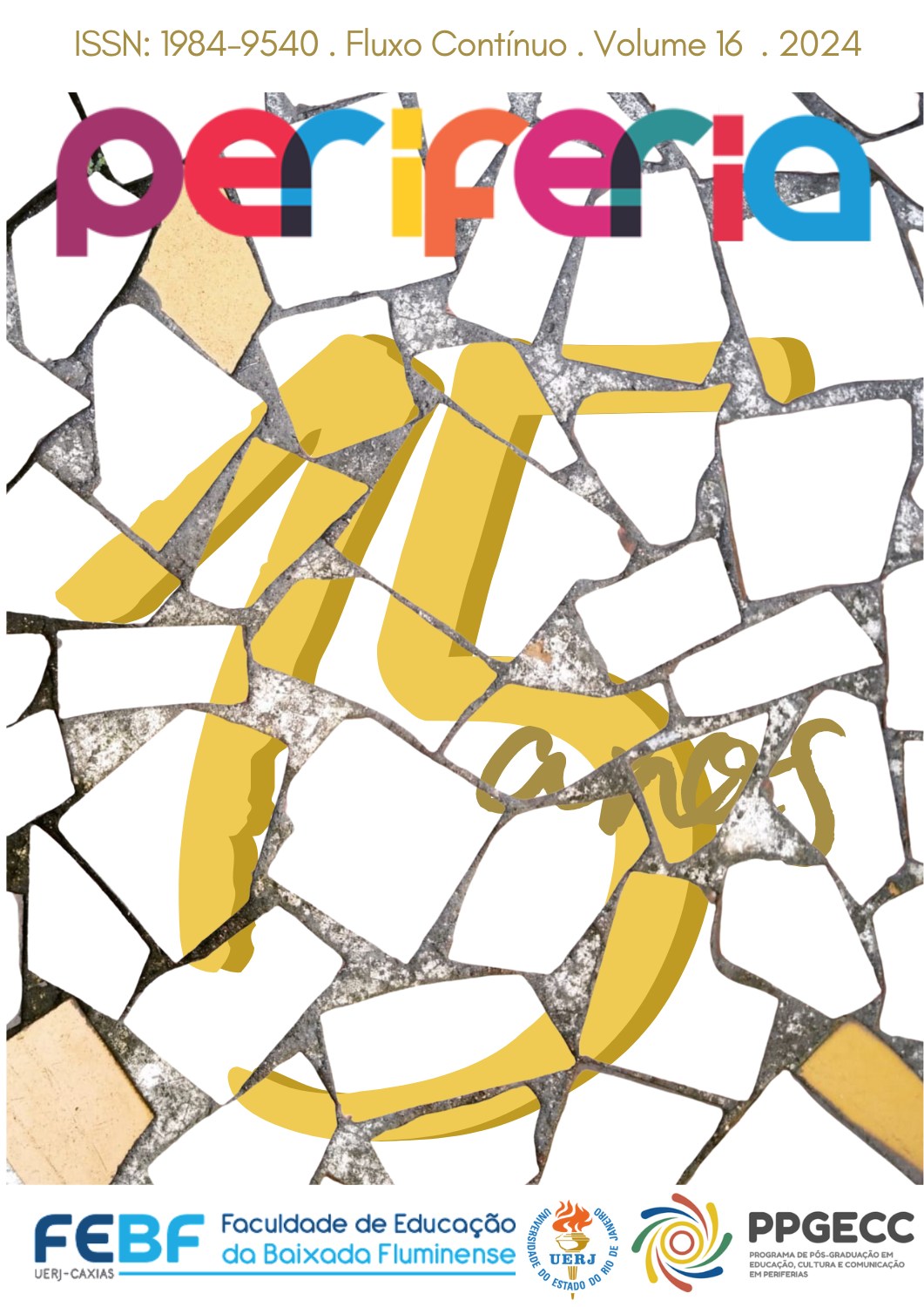CURRICULUM PRODUCTION WITH CHILDREN - TICKETS, "PAPER WHATSAPP" AND EXPERIENCES WITH WRITING
DOI:
https://doi.org/10.12957/periferia.2024.83213Keywords:
Literacy, Child, Curriculum, Discursive processAbstract
A child asked the teacher what a note would be and had his question answered by another child: "ticket is like a paper WhatsApp." Thus happened in class 21 the "Paper Whatsapp," a particular form of interaction and daily writing practice that accompanied them in the classroom. To think about the educational and curricular processes of childhood and their cultural crossings, I start from this curricular experience - the exchange of tickets (between children and these with teachers), understanding this movement as a strategy of the children themselves to maintain the face-to-face use of the chats in online classes. To dialogue and unfold this experience, I support the discursive perspective of literacy (Goulart,??, Smolka, 2012) and curricular production (Lopes and Macedo, 2011), assuming both processes as moving texts, unfinished, in an opening relationship (Derrida, 1971) with meaning. Thus, crossed and mobilized by unexpected and inventive meanings, this article is the result of reflections, experiences and theoretical methodological investments made in dialogue with the fields of the curriculum and literacy with the premise that we are all subjects of language (children and teachers). These reflections have led me to bet that the way in which the curriculum is handled in the classroom needs to take into account the understanding about the learning of reading and writing by the child and his relationship with adults, with his peers and with the world around him.
References
DERRIDA, Jacques. A escritura e a diferença. 2ª edição. São Paulo: Perspectiva, 1971.
DERRIDA, Jacques. Palavra acolhimento. Trad. Fabio Landa. In: Adeus a Emmanuel Levinas. 1ª edição. São Paulo: Perspectiva, 2004.
FREIRE, Paulo. A importância do ato de ler: em três artigos que se completam. 45ª edição. São Paulo: Autores Associados; Cortez, 2003.
FREIREb, Madalena. A paixão de conhecer o mundo: relato de uma professora. 14ª edição. Rio de Janeiro, Paz e Terra, 2001.
GOULART, Cecília. M. A. Para início da conversa sobre os processos de alfabetização e de pesquisa. In: GOULART, Cecília; GARCIA, Inez; CORAIS, Maria Cristina. (orgs.). Alfabetização e discurso: dilemas e caminhos metodológicos. 1ªedição. Campinas, SP: Mercado de Letras, 2019.p.13-46.
GOULART, Cecília; SANTOS, Andréa P. Estudos do discurso como referência para processos de alfabetização em perspectiva discursiva. In: GOULART, Cecília. A et al. A Alfabetização como processo discursivo. 30 anos de A criança na fase inicial da escrita. 1ªedição. São Paulo: Cortez, 2017.p.99-112.
GOULART, Cecília; WILSON, Victoria. Aprender a escrita, aprender com a escrita(orgs.). 1ªedição. São Paulo: Summus, 2013.
LOPES, Alice Casimiro; MACEDO, Elizabeth Fernandes. Teorias do currículo. 1ªedição. São Paulo: Cortez, 2011.
MACEDO, Elizabeth. O Currículo no Portão da Escola. In.: MACEDO, Elizabeth; RANNIERY, Thiago. (orgs). Currículo, sexualidade e ação docente. 1ª edição. Petrópolis: DP Et alli, 2017.p.17-44.
PIRES, Vera Lúcia. Dialogismo e alteridade ou a teoria da enunciação em Bakhtin. Organon, Porto Alegre, v. 16, 20102.
RIBEIRO, Natalia. P.; JESUS, Erika; CORAIS, Maria Cristina; SOUZA, Marta. Não! A gente quer que você escreva no papel! Você ajuda a gente a fazer isso??: O processo de aprender a escrita com a própria escrita. In: In: GOULART,
Cecília; GARCIA, Inez; CORAIS, Maria Cristina. (orgs.). Alfabetização e discurso: dilemas e caminhos metodológicos. 1ªedição. Campinas, SP: Mercado de Letras, 2019.p.89-110.
SMOLKA, A.L.B. A criança na fase inicial da escrita: a alfabetização como processo discursivo. 13ª edição. São Paulo, Cortez, 2012.
SOARES, MAGDA. Novas práticas de leitura e escrita: letramento na cibercultura. Educação em Sociedade. Campinas, vol. 23, n. 81, p. 143-160, dez, 2002.
Downloads
Published
How to Cite
Issue
Section
License
Authors who publish in this journal agree to the following terms:
a. Authors retain the copyright and grant the journal the right of first publication, with the work simultaneously licensed under the Creative Commons Attribution License which allows the sharing of the work with acknowledgment of the authorship of the work and initial publication in this journal.
b. Authors are authorized to take additional contracts separately, for non-exclusive distribution of the version of the work published in this journal (eg, publish in institutional repository or as a book chapter), with acknowledgment of authorship and initial publication in this journal.
Authors are allowed and encouraged to publish and distribute their work online (eg in institutional repositories or on their personal page) at any point before or during the editorial process, as this can generate productive changes as well as increase the impact and the citation of the published work (See The Effect of Free Access).



